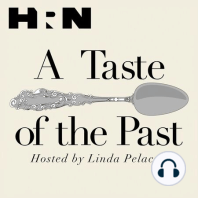37 min listen
Episode 206: Roman Food Culture
ratings:
Length:
36 minutes
Released:
May 21, 2015
Format:
Podcast episode
Description
Elizabeth Minchilli has been eating her way through Rome since she was 12 years old. Eating Rome, is her homage to the city that feeds her, literally and figuratively. This week on A Taste of the Past, host Linda Pelaccio is getting Elizabeths personal story which is a quirky and deliciously entertaining look at some of the citys monuments to food culture. Strolling through her favorite open air markets along with details of amazing coffee, pizza, artichokes and grappa are just the starting points for mouth-watering stories about this ancient city. If you are planning your first trip to Rome or if youve been a dozen times, tune in as Linda spends this episode traveling through the region with Elizabeth as the perfect travel guide. This program was brought to you by Bonnie Plants. The thinking is that the last thing in the world you would want after a big lunch [in Rome] is a big cup of warm milk, which is basically what cappuccino is... so theyll give it to you but theyll be very disapproving. [8:22] These [farmers] markets which are only open on Saturdays and Sundays are really crowded. I think that shows a rebirth of this interest in buying quality food from the source. [16:35] --Elizabeth Minchilli on A Taste of the Past
Released:
May 21, 2015
Format:
Podcast episode
Titles in the series (100)
Episode 19: Mitchell Davis: Linda talks with Mitchell Davis, Vice President of the James Beard Foundation about the Worlds 50 Best Restaurants and the James Beard Awards. by A Taste of the Past
